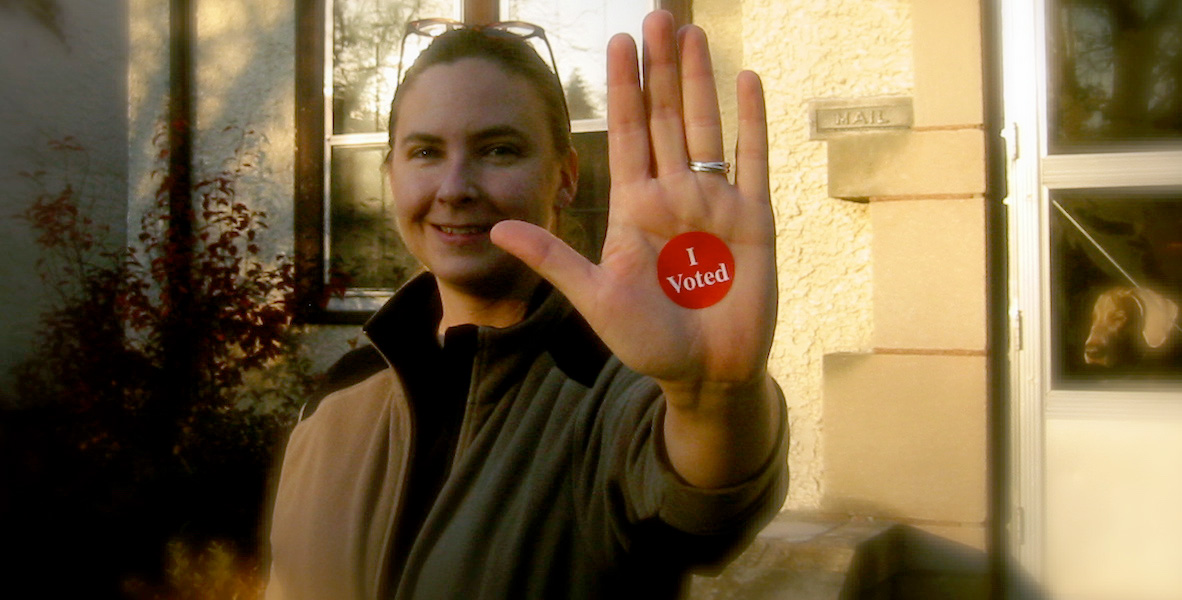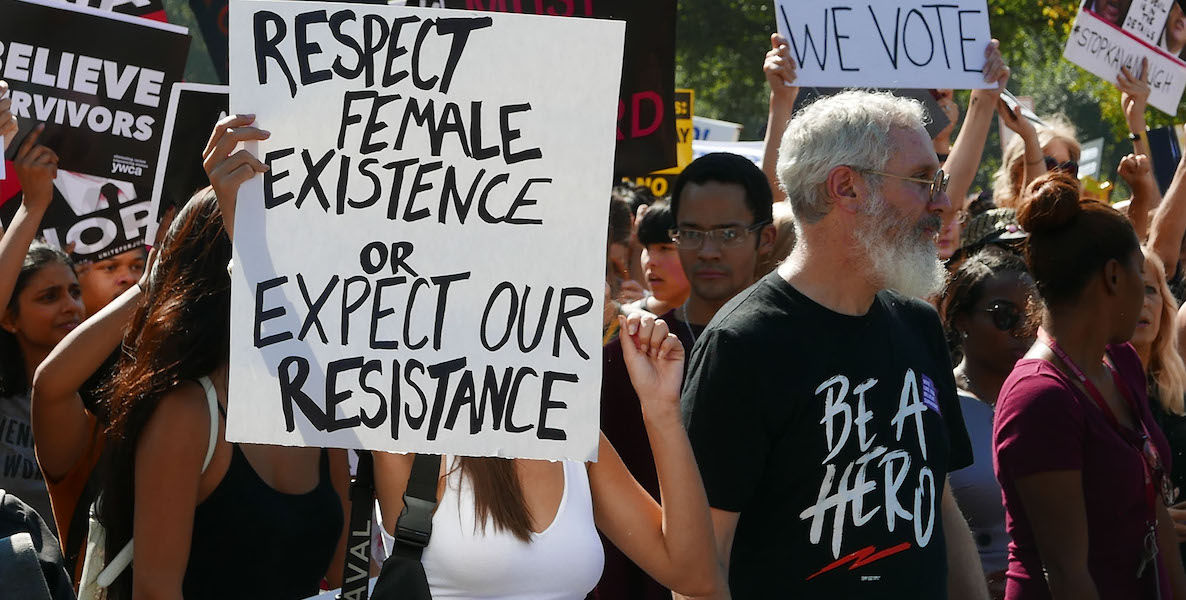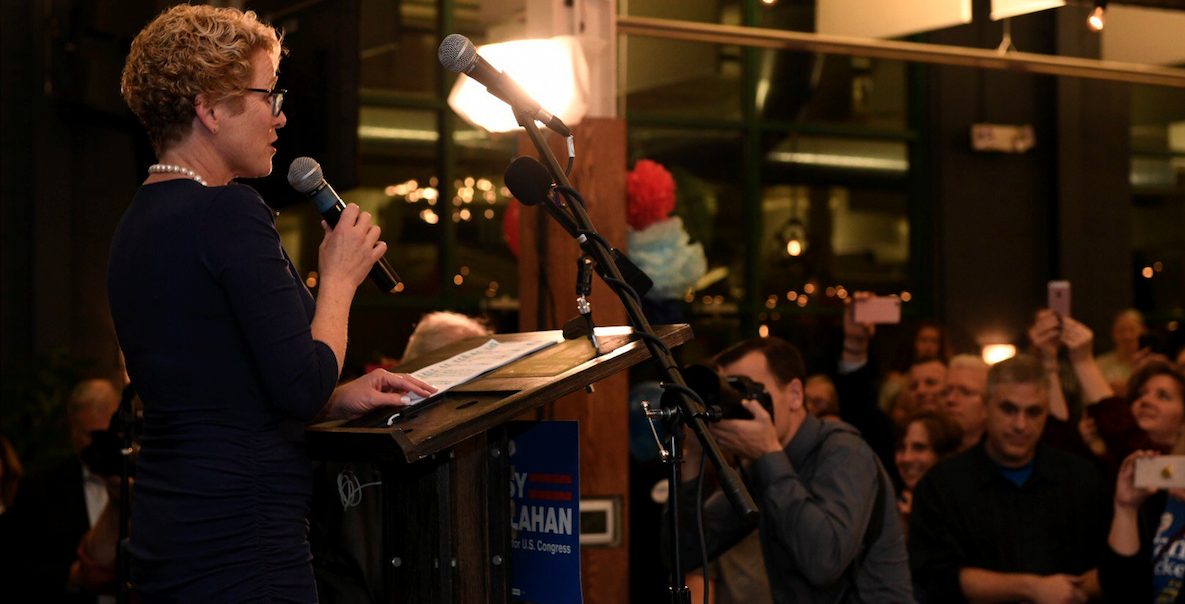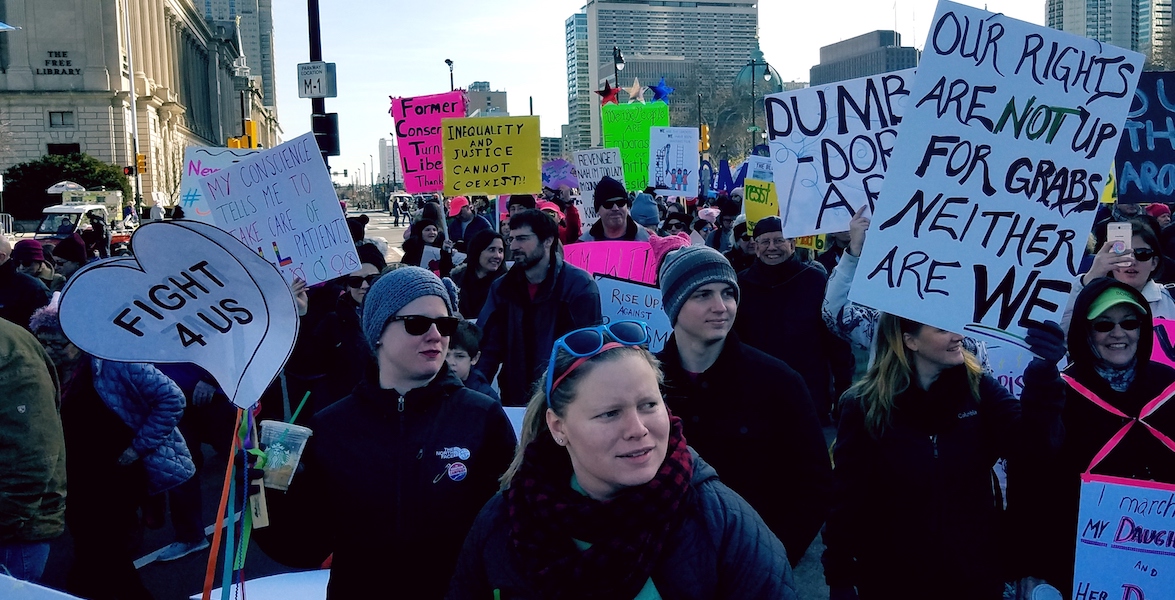Sometimes—okay, often—politics in Philadelphia feels more like farce than reality. Take last week’s episode of Democratic Party Shenanigans: First, Sheriff Jewell Williams, accused by three women of sexual harassment—two of whom have received a total of $157,000 in taxpayer money—was endorsed by the Democratic City Committee, led by former Congressman Bob Brady. Then, after swift and appropriate outrage, he was un-endorsed.
End of story—at least as far as the committee is concerned. But is it? The whole thing was tone deaf, at best, a relic of machine politics, where loyalty to each other matters more than loyalty to voters. Worse, it speaks to a sense of inevitability: It’s as if our local Democratic Party leaders assumed no one would care if they recommended a thrice-accused sexual harasser for another term.
Meanwhile, two women, both African American, are vying for the Sheriff’s post: Rochelle Bilal, president of the Guardian Civic League, the Black police officer’s association; and former Sheriff’s Deputy Malika Rahman. (A pastor, Rev. Larry King, Sr., has also thrown his hat in the ring.) Either would be the first woman elected to the office. But how would you even know that? Not from the leaders of their own party, who declined to endorse either of them. Not from the media, which was up in arms over Williams’ endorsement, but which hasn’t spent a lot of time telling voters about the alternatives to him.
Could it be that Brady and his colleagues are right? Does noone really care? Are we tied to the same-old, for the same-old tired reasons?
It’s hard to know what the office needs—or, even, why it exists as a separate office run by an elected official, except as a way for Democrats to give jobs to loyalists.
Williams, who has denied the charges against him, has been virtually silent this whole campaign season. But that hasn’t kept him out of sight. This weekend, he was in the news for securing an agreement from Immigration and Customs Enforcement authorities to stop arresting migrants in Philadelphia courthouses, and he has been credited with making some needed changes to the Sheriff’s office, including making it easier for homeowners to get money owed to them. His beaming face is on the back of SEPTA buses, advertising job openings; there he is, throughout a several page special advertising section in The Daily News, under the giant yellow words: “Service. Integrity. Excellence.” (Get it?) Those ads—paid for by taxpayers, not Williams’ seemingly non-existent reelection committee—have come under scrutiny from City Controller Rebecca Rhynhart.
So who are the women running to unseat Williams? I caught up with both of them this week, in the aftermath of the endorsement scandal.
![]()
Bilal, 61, is a 27-year veteran of the Philadelphia Police Department, where she worked in the sex crimes and drug trafficking units, before becoming public safety officer for Colwyn Township, overseeing both police and fire, in Delaware County. As head of the Guardian Civic League, she is the counter to the FOP’s John McNesby, who oversaw his union’s endorsement of Donald Trump to be president, and has clashed with District Attorney Larry Krasner. Bilal, representing the Guardian Civic League, called Trump an “outrageous bigot,” and endorsed Krasner in his successful race; Krasner, in turn, has shown support for Bilal. (He appeared at a fundraiser for her in early March.)
Bilal is both a product of, and an exile from, her roots in North Philly, where she grew up the sixth of seven children. “We didn’t realize we were really poor, because everybody was,” she says. “But I knew I needed something more, that I was going to be more than my environment.” More was never supposed to include becoming a cop. “They were really mean to us,” she notes. But starting in the 1970s, when a consent decree forced the Philly Police Department to integrate, the Guardian Civic League sent officers to her neighborhood to recruit young women, including two of Bilal’s close girlfriends. By then, Bilal had moved out—she left home at 16—and had what her mother thought was the “greatest job ever”: On the assembly line at the 30th Street Post Office.
“The Sheriff spends millions of dollars on advertising to get buyers for houses,” Bilal says. “I want to use some of this money to develop programs to keep people in their homes and stop gentrification.”
But that wasn’t enough for Bilal. “I always complained about what we need to combat the problems in my neighborhood,” she recalls. “My girlfriends called me and said, ‘If you want to make a change, you got to do this.’”
In her years as an advocate for African American police officers, Bilal has earned a reputation for taking no guff. In 2009, she helped shut down Domelights.com, a web site run by a Philadelphia police sergeant billed as the “voice of the good guys” that turned into a forum for racist cops—many of whom posted from their desks. Before it shut down, Bilal became the target of threats: “They were posting that I should be raped outside an AIDS clinic.” She has also defended black cops accused of anti-white bias for calling out unethical behavior; and launched a Police Academy program, Steer Straight, that emphasizes ethics. “You don’t need to go along to get along with anybody,” she says. “There’s no ‘no snitch’ policy in the department.”
![]()
As Sheriff, of course, Bilal won’t be charged with much in the way of policing. The job oversees two Sheriff divisions: One that guards courthouses and transports prisoners; and one that runs sheriff’s sales for foreclosed houses. The real estate piece is the most prominent part of the job. But Bilal has no experience in this area. She says, instead, that she will consult with experts to assess how well the office functions, and to work on ways to prevent foreclosures before they happen. “The Sheriff spends millions of dollars on advertising to get buyers for houses,” Bilal says. “I want to use some of this money to develop programs to keep people in their homes and stop gentrification.”
One idea she’s floating: “Neighbor on the Block,” similar to an old federal program called “Cop on the Block” that sold homes to police officers for 50 percent of their value if they agreed to live there for five years. Bilal’s plan would allow neighbors or church members to buy foreclosed homes at a discounted rate, to at least keep the community intact.
![]()
Bilal makes the case that as an outsider, she is the one most poised to bring needed change to the Sheriff’s office. Meanwhile, her seven years experience in the office is what Rahman, 32, says makes her the more qualified woman in the race. Like Bilal, Rahman offers law enforcement experience: After graduating from Chestnut Hill College, she spent three years as a corrections officer, and then seven as a deputy, mostly in the courts. Some of her time, though, was spent in the real estate division, something she says taught her a valuable lesson.
“Displacement is still displacement whether you do it nicely or don’t do it nicely,” she says. “When you’re losing your home, that is the worst part of your life. I want to help people land a little softer than they have landed.”
A Baltimore native who moved to Southwest Philly when she was 14, Rahman resigned from her job to run for Sheriff. “That was a big leap for me, to fight the status quo,” she notes. She also runs a nonprofit, Be A Great You, which connects professionals with teenagers to serve as mentors; educates youth on everything from financial literacy to job, relationship and social skills; and offers small scholarships. Rahman says the group has worked with about 1,000 youth since before and after its official launch in 2017. That work has kept her connected to families, and neighborhoods, where she says she has tried to educate people on ways to stay in their homes before it’s too late.
“Displacement is still displacement whether you do it nicely or don’t do it nicely,” Rahman says. “When you’re losing your home, that is the worst part of your life. I want to help people land a little softer than they have landed.”
Rahman is not worried about her lack of real estate experience. After years of working with mostly men decades older than her—often appointees she says are there because of politics, not experience or ability—she says it’s leadership the office most needs. “If we continue to allow mediocre leadership, we will continue to get mediocre performance out of the office,” she says.
Both Rahman and Bilal said they were surprised by the initial endorsement of the Democratic City Committee because it showed so little respect for, and belief in, women of color. It’s hard to know which, if either, of these women could make the Sheriff’s Office relevant and accountable to Philadelphians.
![]()
In fact, it’s hard to know what the office needs—or, even, why it exists as a separate office run by an elected official, except as a way for Democrats to give jobs to loyalists. (The office has doubled in size in the last decade.) The Sheriff has no term limits, little oversight and reports to no one but the voters—that’s why, despite even Mayor Kenney’s calls for Williams to step down in the wake of harassment charges, he has not had to. There seems no reason why the duties of the office couldn’t fall under the Mayor, as it does in New York, which has a Deputy Commissioner of Finance who serves as “sheriff.”
Making that change would require a vote of 12 City Councilpeople to put eliminating an elected sheriff on the ballot as a charter change—something few have said they’re willing to consider, despite a decade-long effort by Committee of Seventy and other good government groups. There’s that inevitability again: Every four years we wonder why we need this office, which is a locus of controversy again and again; and then we just move on.
Even Bilal and Rahman acknowledge that constituents don’t know what the office does. “That’s a failure,” Bilal says. But they both also note something that is true: As long as it exists, the Sheriff should be someone the city can count on to be honest, to work for residents, to be independent-minded—and to be a person of integrity.
“The office is not the problem,” Rahman says. “The problem is with the people who have gone into the office and not done it right.”
“Should we get rid of the office? That is a conversation we may need to have,” Bilal says. “But until then, it needs to be cleaned up.”







